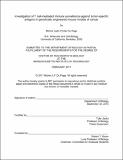Investigation of T cell-mediated immune surveillance against tumor-specific antigens in genetically engineered mouse models of cancer
Author(s)
Du Page, Michel Justin Porter
DownloadFull printable version (20.46Mb)
Other Contributors
Massachusetts Institute of Technology. Dept. of Biology.
Advisor
Tyler Jacks.
Terms of use
Metadata
Show full item recordAbstract
The association of tumor cells and lymphocytes has led to the hypothesis that our immune system actively inhibits the formation and progression of cancer, a phenomenon called tumor immune surveillance. T cells specific to mutant proteins have been identified in cancer patients and the recent success of cancer immunotherapies provides evidence that the immune system can fight this disease. Yet the frequent occurrence of malignant disease despite T cell recognition presents a significant medical problem. Only after we determine how tumors bypass the immune system can immunotherapeutic approaches be improved. To understand how tumors subvert immune responses, tumor transplantation or transgenic mice expressing tumor-associated antigens have been used to model cancer. To assess the role of anti-tumor T cells in models that more accurately reflect the human disease, I developed new systems to introduce exogenous antigens, to mimic neoantigens, into genetically engineered mouse models of lung cancer and sarcomas. Utilizing the mouse model of lung cancer, I show that endogenous T cells respond to and infiltrate lung tumors, delaying malignant progression. Despite continued antigen expression, T cell infiltration does not persist and tumors ultimately escape immune attack. Transplantation of cell lines derived from lung tumors that express these antigens or prophylactic vaccination against autochthonous tumors, however, results in rapid tumor eradication or selection of tumors that lose antigen expression. These results support clinical data that suggest a role for the immune system in cancer suppression rather than prevention. Tumor immune surveillance and immunoediting have largely been defined using carcinogen-driven models of sarcomagenesis. Using a genetically engineered model of sarcomagenesis, I show that immunoediting requires potent T cell antigens and that lymphocytes drive the evolution of less immunogenic tumors by selecting for antigen loss. Finally, immunotherapies have historically been ineffective in treating cancer patients. I show that vaccination against specific antigens expressed in mouse lung cancers leads to sustained anti-tumor T cell responses that eradicate recently initiated tumors. Vaccination also stimulates anti-tumor T cell responses in an antigen-independent fashion by enhancing the expansion and activity of T cells that recognize antigens only expressed in tumors.
Description
Thesis (Ph. D.)--Massachusetts Institute of Technology, Dept. of Biology, 2011. This electronic version was submitted by the student author. The certified thesis is available in the Institute Archives and Special Collections. Cataloged from student-submitted PDF version of thesis. Vita. Includes bibliographical references.
Date issued
2011Department
Massachusetts Institute of Technology. Department of BiologyPublisher
Massachusetts Institute of Technology
Keywords
Biology.